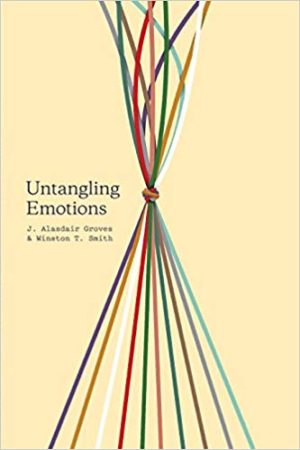Emotions are complex and often confusing. Emotions are our mind and our body’s way of advising us about what is happening in regard to the things that we love. Some of us fear emotions, some are ruled by emotions. The book, “Untangling Emotions”, written by J. Alasdair Groves and Winston T. Smith, is a fascinating dive into understanding emotions and developing a positive path for dealing with them.
The big idea in this book is that emotions provide us with an insight as to what we consider important, i.e., what we love or worship. Some people love their comfort, excitement, themselves, their family, success, reputation, wealth, and so on. The things that we love drive our emotions and the way that we act upon our emotions. Offering a Christian perspective rooted in Scripture, the book encourages us to examine whether the things that we love, those things that drive our emotions, are in line with the things that God loves.

The authors describe the following purposes of emotions:
- Communicate: emotions communicate value
- Relate: emotions help us connect
- Motivate: emotions motivate us
- Elevate: emotions turn us toward God
Some people react to emotions with a “spit it up” attitude, believing that emotions are everything and others adopt a “suck it up” attitude, preferring to ignore their emotions. Instead, the authors encourage us to engage our emotions to better understand them and to respond in a healthy fashion to them.
Because we have many things in our life that are important to a greater or lesser extent, our mind and body are constantly feeling a variety of emotions. At any point in time, one or several of those emotions might rise in its impact. When this occurs, we might engage in the emotion by asking questions such as the following:
- Identify – Am I feeling some particular emotion? What am I feeling?
- Examine – Why am I feeling this emotion? How is this emotion making me want to behave?
- Evaluate – What does this emotion tell me about what is important to me? Is this emotion and this level of importance consistent with who I am and what I want to be important in my life?
- Act – How might I respond to this emotion? How will I respond to this emotion?
Using this framework, the authors then walk the reader through the process of engaging the hardest emotions – fear, anger, grief, and guilt and shame. For example, many people are quick to react to anger. Ephesians 4:29 tells us “Be angry and do not sin” (ESV), which indicates that it is natural to sometimes be angry, but cautions us regarding how we react to that anger. The authors point out that there is both righteous anger unrighteous anger. Righteous anger is a reaction to something like God being mocked or someone attacking someone that we love. More often we feel unrighteous anger in which someone interferes with our little kingdom of self. The process of engaging that anger allows us to examine the root, make a judgment call on its righteousness, and take action or not based on a clear assessment.
Each chapter finishes with a few questions to ponder, with some for the reader for their own processing and some for the reader that desires to help others. The book is a good read for those that want to think deeper about emotions and their impact on our lives and our relationships.

Add your comment